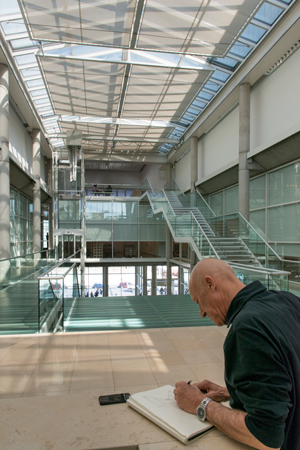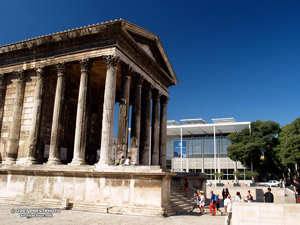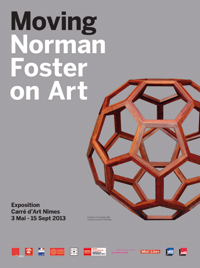 |
 |
 |
 |
 |
 |
| |
 |
|
 |
 |
 |
  |
  |
 |
 |
 |
 |
|
|
 |
|
 |
 |
 |
BUILDING |
 |
|
 |
|
 |
 |
 |
| |
 |
| 
 |
Carré d'Art
Arts Centre |
|
 |
 |
 |
 |
DESIGNER |
 |
|
|
 |
|
 |
 |
 |
| |
 |
|
 |
 |
 |
 |
DESCRIPTION |
 |
|
|
 |
|
 |
 |
 |
|
|
 |
 Médiathèques exist in most French towns and cities. Typically they embrace magazines and books as well as music, video and cinema. Less common is the inclusion of a gallery for painting and sculpture. In Nîmes, the interaction within the same building of these two cultures - the visual arts and the world of information technology - held the promise of a richer totality. The urban context of Nîmes was also a powerful influence. The site faces the Maison Carrée, a perfectly preserved Roman temple. The challenge was to relate new to the old, but at the same time to create a building that represented its own age with integrity. Médiathèques exist in most French towns and cities. Typically they embrace magazines and books as well as music, video and cinema. Less common is the inclusion of a gallery for painting and sculpture. In Nîmes, the interaction within the same building of these two cultures - the visual arts and the world of information technology - held the promise of a richer totality. The urban context of Nîmes was also a powerful influence. The site faces the Maison Carrée, a perfectly preserved Roman temple. The challenge was to relate new to the old, but at the same time to create a building that represented its own age with integrity.
 The Carré d'Art is articulated as a nine-storey structure, half of which is cut into the ground, keeping the building's profile low in sympathy with the scale of the surrounding buildings. At the heart of the plan is a glass-roofed atrium, with a cascading staircase, which references the courtyard vernacular of the region. This space exploits the transparency and lightness of modern materials to allow daylight to permeate all floors. The lower levels house archive storage and a cinema. Above are two library floors, with art galleries on the upper two levels. A reception space on the uppermost floor opens out to a shaded café terrace overlooking a new public square. The Carré d'Art is articulated as a nine-storey structure, half of which is cut into the ground, keeping the building's profile low in sympathy with the scale of the surrounding buildings. At the heart of the plan is a glass-roofed atrium, with a cascading staircase, which references the courtyard vernacular of the region. This space exploits the transparency and lightness of modern materials to allow daylight to permeate all floors. The lower levels house archive storage and a cinema. Above are two library floors, with art galleries on the upper two levels. A reception space on the uppermost floor opens out to a shaded café terrace overlooking a new public square.
The creation of this urban space was an integral part of the project. Railings, hoardings and parked cars were banished and the space in front of the building was extended to create a pedestrianised place - a new social focus and an appropriate setting for the Maison Carrée. Lined with café tables and thronged with people, the square has reinvigorated the social and cultural life of Nîmes. Together with these urban interventions, the Carré d'Art shows how a building project, backed by an enlightened political initiative, can provide a powerful catalyst for reinvigorating the social and physical fabric of a city. |
|
 |
 |
 |
 |
 |
 |
 |
LOCATION |
 |
|
|
 |
|
 |
 |
 |

|
 |

|
Continent |
|
 |
|
Nation |
|
 |
|
Region |
|
 |
|
District |
|
 |
|
Town |
|
 |
|
Address |
|
 |
|
|
|
 |
|
Telephone |
|
 |
|
Fax |
|
 |
|
Website |
|
 |
|
E-mail |
|
 |
|
 |
 |
 |
 |
MAP |
 |
|
|
 |
|
 |
 |
 |
| |
 |
|
 |
 |
 |
 |
|
TYPOLOGY |
 |
|
|
 |
|
 |
 |
 |
Main |
 |
|
 |
ARCHITECTURE | Buildings for cultural activities
Art galleries and exhibition areas
Libraries and media libraries
Museums and buildings for exhibitions
Art museums
| |
|
|
 |
|
Additional |
 |
|
 |
ARCHITECTURE | Commercial buildings
Bars, cafeterias
| |
 |
 |
 |
 |
CHRONOLOGY |
 |
|
|
 |
|
 |
 |
 |
Project |
 |
|
 |
| 
 |
1984 - 1987
project winner of competition
|
|
Realisation |
 |
|
 |
| 
 |
1987 - 1993 |
|
 |
 |
 |
 |
AWARDS |
 |
|
|
 |
|
 |
 |
 |
| 1998 |
 |
|
 |
| Veronica Rudge Green Prize in Urban Design |
|
 |
 |
 |
|
 |
|
| 1993 |
 |
|
 |
|
 |
 |
 |
 |
 |
 |
 |
THE BUILDING IN CINEMA |
 |
|
|
 |
|
 |
 |
 |
| Title |
 |
|
 |
| How much does your building weigh, Mr. Foster? |
|
| Directed by |
 |
|
 |
| Norberto Lopez Amado, Carlos Carcas |
|
| Nationality |
 |
|
 |
|
| Year of production |
 |
|
 |
|
| Cast |
 |
|
 |
| Norman Foster, Tony Hunt, George Weidenfeld, Richard Rogers, Bono, Deyan Sudjic, Paul Goldberger, Carl Abbott, Alain de Botton, Anish Kapoor, Richard Serra, Anthony Caro, Richard Long, Buckminster Fuller, Ben Cowd, Cai Guo-Qiang, Ricky Burdett, Spencer de Grey, David Nelson, Narinder Sagoo, Nigel Dancey, Loretta Law, Mouzhan Madidi, Stefan Behling, Jurgen Happ, Gerard Evenden
|
|
| Building's role |
 |
|
 |
|
| Annotations |
 |
|
 |
Producer: Elena Ochoa
Executive Producer: Antonio Sanz
Writer & Narrator: Deyan Sudjic
Music: Joan Valent
Director of Photography: Valentin Alvarez |
|
 |
 |
 |
 |
 |
 |
 |
BIBILIOGRAPHIC REFERENCES |
 |
|
|
 |
|
 |
 |
 |
|
 |
| Helio Piñón , "Lo simple no siempre es claro / Simple does not always mean clear", Quaderns d'arquitectura i urbanisme 252, invierno/winter 2006, pp. 126-131 |
|
|
| "Norman Foster", a+u. Architecture and urbanism 310, july 1996, pp. 72-93 |
|
|
| Geert Bekaert, "Norman Fosters Carre d'art in Nimes. L'ivresse du reel/Norman Foster's Carre d'Art in Nimes. The drunkenness of the real", Archis 10/93, october 1993, pp. 27-35 |
|
|
| David Cohn, "Mediterranean light. Carre d'Art, Nimes", Architectural Record 10/93, october 1993, pp. 62-71 |
|
|
| "El Beaubourg del sur. Mediateca del Carre d'Art, Nimes/The Beaubourg of the south. The Carre d'Art mediatheque, Nimes", Arquitectura Viva 32, septiembre-octubre/september-october 1993, pp. 46-53 |
|
|
| Norman Foster, "Foster Associates. Carré d'Art, Nîmes", GA Document 37, september 1993, pp. 36-49 |
|
|
| Yehuda Safran, "Norman Foster. Le Carré d'Art, Nîmes", Domus 751, luglio agosto/july august 1993, pp. 25-35 |
|
|
| Elisabeth Allain-Dupre, Tony Fitzpatrick, "Gentle giant. Foster's Carre d'Art in Nimes", Architecture Today 39, june 1993, pp. 42-44, 47-48 |
|
|
| Michele Champenois, Jean-Paul Robert, "Foster a Nimes, histoire du projet/Foster in Nimes, the story of a project", L'Architecture d'Aujourd'hui 287, juin/june 1993, pp. 4-11 |
|
|
"Construire en centre ancien / Building in an ancient town centre", Architecture intérieure. CREE 254, juin-juillet/june-july 1993, pp. 100-131
"Carre d'Art, Nimes", Architecture intérieure. CREE 254, juin-juillet/june-july 1993, pp. 100-109 (100-131) |
|
|
| Adrian Gale, "Contributing to a city", World Architecture 24, 1993, pp. 84-87 |
|
|
| Jonathan Glancey, "Nimes schemes. Architects: Foster Associates", The Architectural Review 1059, may 1985, pp. 31-39 |
|
|
| Patrice Goulet, "Nîmes. Concours pour la Médiathèque et le Centre d'Art contemporain, octobre 1984", L'Architecture d'Aujourd'hui 236, décembre/december 1984 [Habitacion individuelles], pp. 61-69 |
|
 |
 |
 |
 |
 |
 |
 |
ADDITIONS AND DIGRESSIONS |
 |
|
|
 |
|
 |
 |
 |
| |
 |
Moving
Norman Foster on Art |
 Exhibition: 3 May / 15 September 2013 Exhibition: 3 May / 15 September 2013
» IMAGES |
|
 |
 |
 |
 |
 |
 |
 |
CLIENT |
 |
|
|
 |
|
 |
 |
 |
| |
 |
|
 |
 |
 |
 |
DIMENSIONAL
DATA |
 |
|
|
 |
|
 |
 |
 |
| Surface |
 |
|
 |
|
 |
 |
 |
 |
STRUCTURES |
 |
|
|
 |
|
 |
 |
 |
| |
 |
Ove Arup & Partners
Tony Fitzpatrick |
|
 |
 |
 |
 |
STAFF |
 |
|
|
 |
|
 |
 |
 |
Project  |
 |
| Sir Norman Foster and Partners |
|
|
 |
|
Associate designers  |
 |
| Ken Shuttlework, David Nelson |
|
|
 |
|
Collaborators |
 |
| Graham Philips, Robin Partington, Rodney Uren, Paul Kalkhoven, Alex Reid, Arthur Branthwaite, Chris Eisner, Tim Quick, Max Neal, Chris Abell, Nic Bailey, Serge Belet, Ruth Conroy, Arno de Bussièries, Katherine Delpino, Pascal Desplanques, Shaun Earle, Nicholas Aldridge, Bertrand Feinte, Martin Francis, Garnet Geissler, Jean-Pierre Genevois, Bruce Graham, Michael Haste, Edward Hutchinson, Michael Jones, Alexander Lamboley, Huat Lim, John McFarland, Sophie Mers, David Morley, Jesper Nelson, Irene Pham, Victoria Pike, Etienne Renault, Joel Rutten, Hartwig Schneider, Kriti Siderakis, Ken Wai, Cindy Walters, Martin Webler, Louisa Williams |
|
Interior design |
 |
| Norman Foster e Sabiha Foster |
|
 |
 |
 |
 |
CREDITS |
 |
|
|
 |
|
 |
 |
 |
| |
 |
Photos © Nigel Young / Foster + Partners, Monostudio
Text edited by Foster + Partners
Courtesy by Foster + Partners, Prestphoto | architectour.net
|
|
 |
  |
 |
|
|